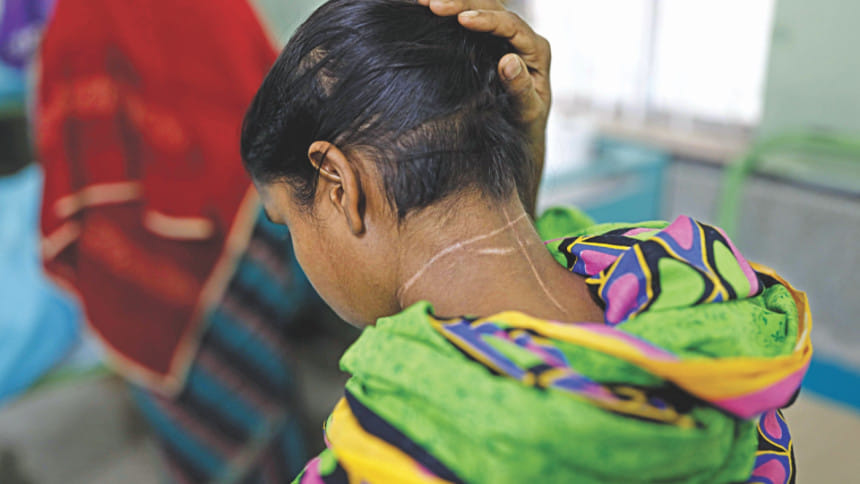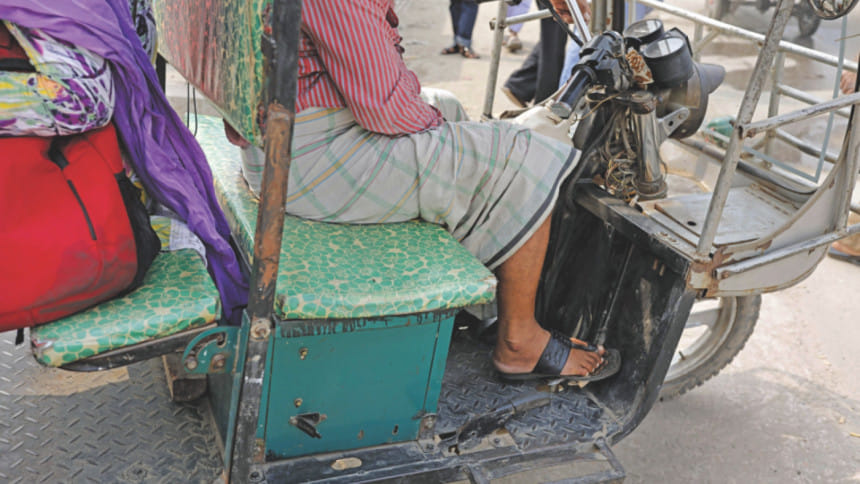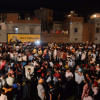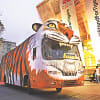Beware when on easy bike

All she felt was a sudden jerk and then her limbs went numb. Twenty-year-old Sumaiya Sweetie was paralysed for life from the neck down.
"There was no pain and I could talk but I could not feel my hands and legs," said Sweetie.
She was lying on a bed at the female ward of the Centre for the Rehabilitation of the Paralysed (CRP) while talking to this correspondent recently.
Sweetie had an accident in a three-wheel battery-run auto-rickshaw, popularly known as easy bikes, on June 25 last year.
She was six months pregnant.
"I was going with my husband to the boat jetty from Barisal Sadar, where I live with my in-laws," Sweetie said. "I was sitting on the passenger seat just behind the driver's seat."
Sweetie was wearing a salwar kameez and an urna (long scraf) wrapped around her head and neck.
One loose end of the urna went through a gap between the driver's seat and the passenger seat, on which Sweetie sat, and got entangled with the motor's prop shaft, about 20 minutes after the vehicle started moving.
Unaware of where the loose end of her urna ended up, Sweetie just felt a sudden pull and that was that.
She is now paralysed from the neck down. Her baby, by a miracle, survived and doctors performed a c-section on her two months after the accident.
Sweetie is among 26 patients who went to the CRP with injuries from scarf strangulation in the last one year and a half.
"Before, we used to get patients with spinal cord injuries from attempted suicide by hanging incidents or from falling incidents. But they were few in numbers," said Muhammed Shahriar Zaman, research officer of the CRP.
When the number of patients the CRP received with injuries similar to Sweetie's began to rise, the research unit started to document those. The 37-year-old organisation on the outskirts of Dhaka in Savar specialises in spinal cord injuries, their treatment, and rehabilitation of the patients.
It discovered that most patients with spinal cord injuries last year were victims of accidents in which draping urnas and shawls around their heads and necks got tangled with motors of easy bikes due to the flawed design of the vehicle.
Between May 2014 and July 2015, the CRP received 17 such patients, all female, aged between 11 and 32 years. Of them, 6 percent were passengers of traditional rickshaws and 88.2 percent were of battery-run auto-rickshaws.
Most of the patients reported that they were sitting on the seat just behind the driver facing the opposite direction to travel.
Among the patients, 77 percent were wearing urnas and 18 percent were wearing shawls, said Shahriar, adding that the majority of the patients came from rural areas but the accidents happened on roads near urban areas.
"Since battery-run auto-rickshaws go faster than traditional rickshaws, the thrust is sudden and strong and it displaces the lower vertebras of the cervical region of the spinal cord," explained Israt Jahan Urmee, registrar of medical service wing of the CRP.
Injury to the spinal cord, the communication system between the brain and the body, could leave a person paralysed for life.
"Not just the movement and sensation of the limb muscles, but victims also lose control of urination and defecation," explained Urmee.
"If the spinal cord is completely dissected, then there is no possibility of recovery and such injuries are called complete case. Incomplete case patients, however, have some nerves impaired but the hands may retain some sensation," she said, adding that Sweetie was a complete case.
Sweetie came to the CRP in October hoping to get back some sensation on her limbs. Her life now circles around physiotherapies and occupational therapy lessons and learning wheelchair skills.

"When I first came here I had no feelings in my body, now I can move my right arm a little and sit up on the wheelchair with the help of the nurses," she said.
"If I can at least move in a wheelchair, I can see my son, Alif," she said.
She described how her elder sister breastfeeds and looks after the baby, her first born.
Another scarf strangulation patient Shirina Begum, 35, also said how she missed her youngest son, a student of class-I. Compared to Sweetie, she was at a better stage.
"I was going to Debidwar of Comilla from Boroshal Gor with my family on an easy bike. We had almost reached our destination when I felt a sudden pull on my neck and I fell to the floor," Shirina described, adding that she was wearing a shawl and an urna draped around her head.
CRP research officer Shahriar said majority of the patients they documented were students. "Most of them were not careful with their urnas, which they had worn around their necks," he said.
Founder of CRP, Valerie Taylor told The Daily Star, "This is an injury that can be prevented very easily through awareness."
The easy bikes are illegal in Bangladesh. They have no registration with the BRTA and the flawed vehicles contributed to accidents, in which people are left paralysed for life.

 For all latest news, follow The Daily Star's Google News channel.
For all latest news, follow The Daily Star's Google News channel. 








Comments